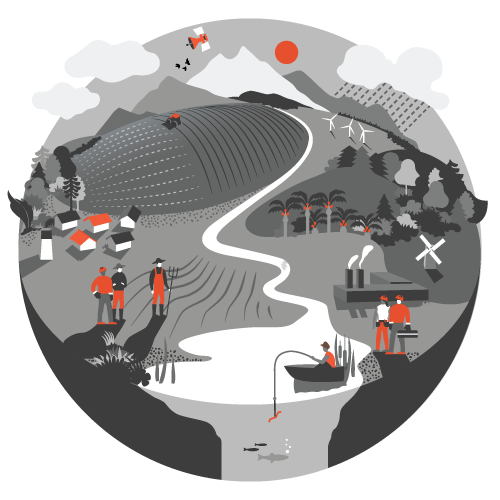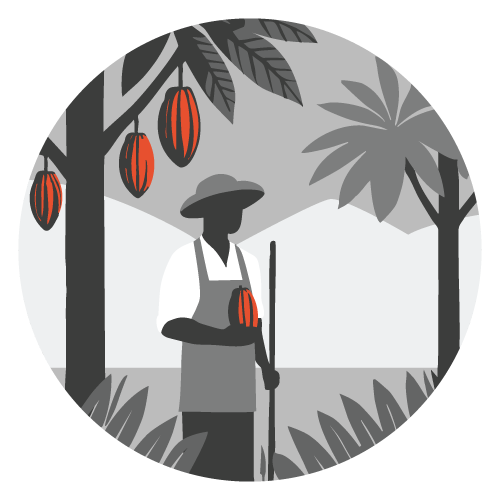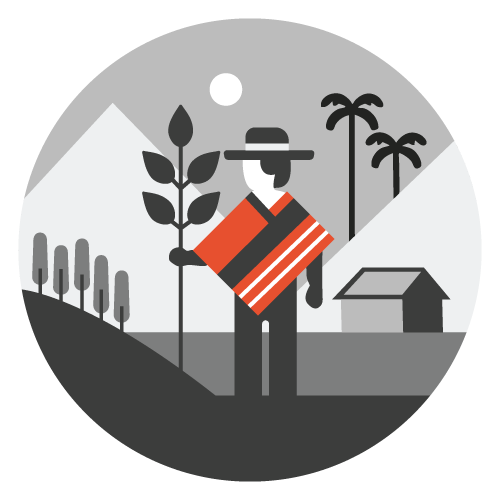Share

Scott Poynton muda mendengarkan acara sains yang membahas tentang pohon
"Acara tersebut diisi oleh Richard St. Barbe Baker, ahli kehutanan paling terkenal di dunia dan saya terpukau. Ia memadukan puisi, seni, dan sains," kenang Scott. "Saya baru beranjak usia 15 tahun dan saya duduk mendengarkan celotehannya selama setengah jam. Di akhir acara, saya benar-benar yakin, saya ingin menjadi ahli kehutanan."

Scott Poynton mendirikan Tropical Forest Trust
Beberapa tahun kemudian, di tahun 1999, Global Witness mengeluarkan laporan ‘Made in Vietnam, Cut in Cambodia’ memenuhi pemberitaan media, mengungkap bahwa furnitur taman yang dijual di Eropa dibuat dengan mengorbankan hutan hujan tropis Kamboja. Hal ini mendorong Scott Poynton untuk mendirikan Tropical Forest Trust (TFT) dengan misi utama mengubah situasi tersebut.
Idenya sederhana, sorotan publik dari publikasi laporan tersebut menjadi langkah awal untuk bekerja sama dengan perusahaan dan mendorong perubahan dalam operasional perusahaan. Pendekatan ini masih digunakan sampai sekarang, bekerja di situasi yang sulit antara perusahaan dan Lembaga Swadaya Masyarakat (LSM) untuk mendorong perubahan.

Staf pertama TFT bekerja dari sebuah kawasan industri di Inggris
Bjorn Roberts, staf pertama TFT, memulai pekerjaannya dari sebuah kantor kecil di kawasan industri Kidlington, dekat Oxford, Inggris. "Kami tidak memiliki situs web atau hal semacamnya. Fokus kami sederhana, mengubah furnitur taman yang merusak lingkungan menjadi sesuatu yang lebih berkelanjutan," kenangnya.

Kerja kami di Afrika berhasil memperoleh sertifikasi untuk area dengan luas dua kali Luksemburg, melindungi hutan dan hak masyarakat adat
Pada tahun 2004, kami mulai bekerja dengan Congolaise Industrielle des Bois (CIB), salah satu perusahaan kayu terbesar di Afrika yang beroperasi di Cekungan Kongo (Congo Basin). Dalam dua tahun, kami berhasil memperoleh sertifikasi untuk 450.000 hektar hutan. Langkah ini membuka jalan untuk semakin luasnya hutan yang tersertifikasi, bahkan di luar area lingkup kerja kami.
Kami juga mendampingi CIB membangun hubungan yang lebih baik dengan komunitas Pygmy, masyarakat semi-nomaden yang hidup di hutan yang dikelola oleh perusahaan. Dengan bantuan perangkat GPS, komunitas ini berjalan memetakan wilayah mereka, menandai area penting, dan mencatatnya di perangkat genggam. Pada tahun 2007, melalui fasilitasi kami, stasiun radio pertama di genrenya mulai mengudara, menyiarkan berita dalam 12 bahasa adat kepada ribuan penduduk setempat.

Tropical Forest Trust berevolusi menjadi The Forest Trust (TFT). Misi yang sama, dengan Cakupan yang Lebih Luas!
Ririlisnya Stern Review mengungkap bahwa deforestasi sangat berkaitan dengan sektor pertanian, kami menyadari untuk melindungi hutan tidak cukup hanya fokus pada wilayah tropis atau satu jenis komoditas saja. Kami memahami untuk menciptakan dampak yang lebih besar, kami harus melangkah lebih jauh dari sekadar komoditas kayu.
Itu berarti nama ‘Tropical Forest Trust’ tidak lagi merepresentasikan identitas kami. Kami ingin memperluas jangkauan ke komoditas lain seperti kedelai dan kelapa sawit, serta berkontribusi mencegah masa depan distopia seperti yang digambarkan dalam Laporan Stern. Maka, lahirlah ‘The Forest Trust’ (TFT), organisasi yang sama dengan misi yang sama, namun dengan visi dan cakupan yang lebih luas.

Setelah intervensi panjang yang dipimpin oleh TFT, senjata berhasil disingkirkan dari perkebunan jati di Jawa, Indonesia, mengurangi kekerasan dan menyelamatkan nyawa
Pada tahun 2001, suara tembakan masih sering terdengar di hutan jati Perhutani di Pulau Jawa. Para penjaga bersenjata dikerahkan melindungi kawasan dari penduduk desa dan penebang liar. Delapan tahun kemudian, dengan fasilitasi TFT, semua senjata akhirnya dikunci dengan aman dan tak lagi digunakan.
Pencurian kayu dari hutan jati Perhutani saat itu sangat tinggi, dan kekerasan dianggap sebagai satu-satunya solusi. Namun, karena kecaman publik yang meluas, serta pencabutan sertifikasi pengelolaan hutan oleh Forest Stewardship Council (FSC) akibat penebangan liar, Perhutani mulai mencari pendekatan baru. Sejak 2003, kami bekerja sama dengan mereka untuk menghentikan kekerasan dan memperbaiki praktik pengelolaan hutan.

Bekerja sama dengan kami, Nestlé berkomitmen menghilangkan deforestasi dari rantai pasoknya, menginspirasi perusahaan lain berkomitmen hal serupa
Tahun 2010 menjadi momen penting bagi TFT. Nestlé mulai bekerja sama dengan kami untuk mengubah rantai pasok minyak sawit mereka dengan komitmen nol deforestasi.
Didorong oleh kampanye dari Greenpeace yang menyoroti keterlibatan pemasok mereka dalam perusakan hutan, Nestlé mulai bekerja sama dengan kami untuk menyelaraskan praktik bisnis mereka dengan nilai-nilai yang dianut perusahaan. Kolaborasi ini menginsipirasi banyak perusahaan untuk mengikuti jejak serupa. Golden Agri-Resources (GAR) salah satu yang juga memulai transformasi dalam bisnis mereka.

Bersama Greenpeace dan GAR, kami merancang Pendekatan Stok Karbon Tinggi (SKT), metodologi untuk mengidentifikasi hutan yang perlu dilestarikan

TFT meluncurkan program Rurality untuk kehidupan petani yang lebih baik
Dengan berada dan hadir langsung di lapangan di rantai pasok berbagai belahan dunia, Rurality dirancang untuk mendukung petani meningkatkan ketangguhan mereka. Hingga kini, kami telah bekerja dengan lebih dari 1.500 petani.

Teknologi satelit bergabung dalam upaya melawan deforestasi
TFT dan Airbus meluncurkan layanan pemantauan bernama Starling. Teknologi ini membantu perusahaan melindungi kawasan hutan, sekaligus mendeteksi dan merespons deforestasi dengan cepat dan akurat.

Sebuah gerakan pun bangkit saat kami bermitra dengan industri kelapa sawit Malaysia untuk mengembalikan ribuan paspor pekerja migran
Bekerja sama dengan perkebunan dan pabrik kelapa sawit di Malaysia membuahkan hasil dengan ratusan pekerja migran yang memegang kembali paspor yang tadinya ditahan. Upaya ini memicu aksi berantai yang menginspirasi Wilmar melakukan hal serupa, mengembalikan paspor kepada 10.000 pekerjanya di tahun 2018.

Kami memulai proyek regeneratif mengembalikan kesuburan tanah di Prancis dan India, mendukung petani mengubah praktik pertanian mereka

TFT resmi berganti nama menjadi Earthworm Foundation. Kami memperluas dan memperkuat misi menghidupkan kembali habitat dan ekosistem, serta memastikan penghormatan hak asasi manusia bagi komunitas dan pekerja pada rantai pasok di seluruh dunia

Regenerating sourcing regions through the landscape approach
In key regions across the globe, from forests in Malaysia to farmlands in Côte d’Ivoire, we deepened our focus on landscapes. These complex ecosystems are where supply chains and communities meet. By working alongside farmers, companies and local actors, we began to co-create regenerative approaches tailored to each place, supporting nature, livelihoods and long-term resilience.

Protecting and restoring Cavally Forest Reserve
In Côte d’Ivoire, efforts to safeguard one of the country’s last intact forests began to show results. Through joint patrols, reforestation, and close work with cocoa-farming communities, early signs of regeneration emerged in the Cavally Forest Reserve. Forest loss slowed, native tree seedlings took root, and trust grew among partners, proving that collaboration can turn the tide on deforestation.

Building regenerative landscapes in the Peruvian Amazon
In the heart of Peru’s Ucayali region, our work with local producers, mills and government bodies began to bear fruit. Through land use studies and forest classification using the High Carbon Stock (HCS) and High Conservation Value (HCV) tools, we laid the groundwork for sustainable planning. But it was the introduction of Holistic Farm Planning that marked a turning point, shifting the focus from compliance to farmer-led regeneration. Together, we’re learning how to bring life back to the land while securing livelihoods.